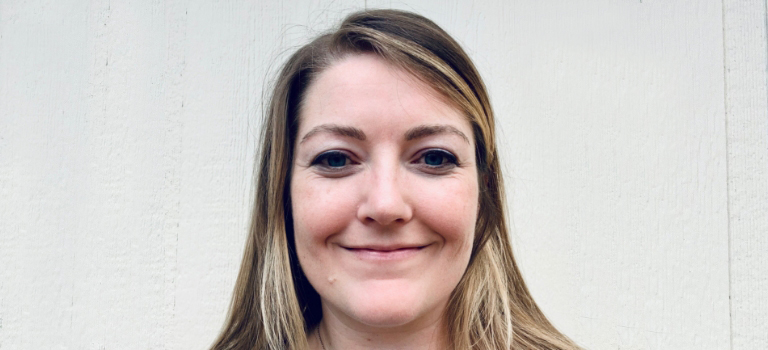Meet Mary Ruggeri, the New Clinical Site Coordinator for Yale PA Online

Mary Ruggeri, MMSc, MEd, PA-C, Clinical Site Coordinator for Yale PA Online
Mary Ruggeri, MMSc, MEd, PA-C, was no stranger to the Yale School of Medicine Physician Assistant (PA) Online Program when she started working as the clinical site coordinator in 2021.
As a Yale PA Online alumna, Ruggeri had been a part of the program’s inaugural cohort of students. After graduating, she began practicing at an outpatient psychiatry clinic in Austin, Texas—and now, she has returned to the Yale PA Online Program to help students successfully navigate the clinical rotation process she once went through herself.
“I’m so happy to be back,” said Ruggeri. “I loved my time as a student and always knew I wanted to stay involved. This is my opportunity to do exactly that.”
Leveraging a Background in Education
Prior to enrolling in PA school, Ruggeri earned a Bachelor of Science in psychology from Loyola University of Chicago and a Master of Education from the University of Notre Dame.
Her background in education was a big reason why she chose Yale PA Online in the first place—and why she was excited to return to the program as the clinical site coordinator. “I’ve always been really drawn to Yale PA Online’s innovative curriculum and came back to help make the program the best it can be,” shared Ruggeri.
For her, Yale PA Online’s virtual learning environment was a major selling point. “Since it’s an online program, every student has the unique ability to complete most of the clinical rotations where they live,” explained Ruggeri. Rather than relocating for school, completing rotations in New Haven and then moving back to Austin, she gained hands-on experience in her own hometown. “When I graduated, I had a strong local network to reach out to for job opportunities,” she said. “That was so valuable.”
Serving on the Physician Assistant Education Association’s (PAEA) Future Educator Development Steering Committee while a student in the Yale PA Online Program was another experience that prepared Ruggeri for her new role. “Being on the board of directors for PAEA gave me a much better understanding of the PA education landscape,” she explained. “It taught me about some of the struggles and successes that programs have and initiatives they’re working on to drive improvement. That was really useful in helping me understand what a career in PA education would look like.”
Shaping Positive Program Outcomes
Since starting as a clinical site coordinator, Ruggeri has credited much of her success in the role to her recent experience as a Yale PA Online student. “I’m able to be proactive in preparing students for what to expect and how to handle certain situations because everything about the program is very fresh in my brain,” she explained.
Ruggeri draws on her own background to guide students through the uncertainty that comes with transitioning from didactic year to clinical rotations. “Students have a lot of questions during this process,” she shared. “Clinical rotations are a big change from didactic year, where you’re learning and working mostly on your own schedule. During site placements, you’re operating under someone else’s schedule and rules. And every site is different: They might have different hours, different workflows, different patients.”
Because of that, she says, there can be many unknowns—including when students start the clinical year and every time they subsequently change rotation sites. “Adjusting to clinical rotations can be difficult, and students have lots of questions,” said Ruggeri. “It’s my job to support them through the process.”
Mastering the Science and Art of Medicine
Looking back on her time as a Yale PA Online student, Ruggeri is especially grateful for her clinical rotations. “Clinical rotations are a huge part of becoming a PA because they’re where you take the skills you’ve been working on in didactic year and put them into practice,” she said.
“During clinical rotations, you get to see patients with conditions that you’d only learned about in class before that point,” Ruggeri explained. “Medical knowledge is vast, so it’s useful to have real-world memories to draw from. The more hands-on experience you get, the better you understand different conditions and the more information you’re able to retain. Clinical rotations help you master the science and art of medicine.”
At the same time, clinical rotations give students a chance to explore different areas of medicine, which Ruggeri says makes a major difference in providing professional direction. When she started school, Ruggeri did not think she would want to work in psychiatry. “But then when I was on the rotation, I loved it,” she said. “And after graduating, I started practicing at an outpatient psychiatry clinic.”
Offering Advice for Aspiring PAs
Ruggeri encourages Yale PA Online students to go into each clinical rotation with an open mind and an avid interest in learning. “Medicine is vast, but it’s all interconnected,” she said. “You might wind up being a surgical PA whose patient needs to follow up with their primary care provider, and understanding what that other side looks like is really valuable. Or, you might be working in primary care and have a patient who needs surgery. If you’ve done a surgical rotation, you can explain to them what that process and procedure will look like from experience.”
Another piece of advice she shares is to take every opportunity, no matter how small. “Even if it’s practicing something you’ve done a million times before, do it,” said Ruggeri. “The more times you can see or practice something, or even just hear a normal heartbeat, the better you’ll be as a future provider.”

